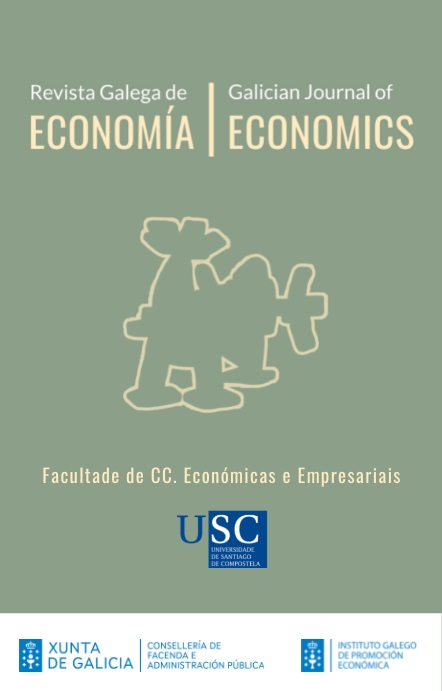CURRENT ACCOUNT BALANCE, INFLATION, INDUSTRY AND SUSTAINABLE DEVELOPMENT IN JORDAN
Contido principal do artigo
Resumo
framework for an economic model that includes the determinants of inflation where
current account deficit is one of them. The study finds out that the increase in current
account deficit affects domestic inflation negatively in the long run. This result would be
attributed to the fact that current account deficit absorbs big part of the excess in the
domestic demand, in addition to the long run flexibility of the economy to produce
substitutes for imported goods. However, in the short run, it was found that current
account deficit affects domestic inflation positively. It was found that for this period there
is no enough flexibility for the Jordanian economy to produce enough goods to substitute
imports, which leads to inflation.
Palabras chave
Detalles do artigo
Citas
Alkhatib, S. (2006) “Evidence on the Export- Led Growth Hypothesis: the Jordanian Case”, Dirasat Administrative Sciences. Vol. 33-2, pp.1-9.
Central Bank of Iceland (2000) “Higher inflation and current account deficit call for restrictive economic policies, Monetary Bulletin, Vol. 1: pp. 3-11.
Charermza, W., Deadman, D. (1997) “New Directions in Econometric Practice”, second edition, Edward Elgar, England.
Choudry, T. (1995) “Long-Run Money Demand Function in Argentina During 1935-1969: Evidence from Cointegration and Error Correction Model”, Applied Economic, Vol. 27: pp. 661-667.
Chude, D., Chude N. (2015), “Impact of Inflation on Economic Growth in Nigeria”, International Journal of Business and Management Review, Vol. 3-5, pp. 26-34.
Dikey, D., Fuller, W (1981) “Likelihood Ratio Statistics for Autoregressive Time Series with a Unit root”, Econometrica, Vol. 49-4: pp. 1057-1072.
Engle, R. and Granger, C. (1987) “Co-integration and Error Correction: Representation, Estimation and Testing”, Econometrica, Vol. 55-2: pp. 251-276.
Granger, C. (1986) “Development in the Study of Cointegration Economic Variables”, Oxford Bulletin of Economics and Statistics, Vol. 48-3: pp. 213-228.
Guisan, M.C. (2008). “Manufacturing And Economic Evelopment: ntersectoral Relationships In Europe, America, Africa And Asia-Pacific, 1999-2006”, Regional and Sectoral Economic Studies, Vol. 8-2.1
Guisan, M.C. (2014). “World Development, 2000-2010: Production, Investment And Savings In 21 Areas Of America, Africa, Asia-Pacific, Europe And Eurasia”, Regional and Sectoral Economic Studies, Vol. 14-2.1
Guisan, M.C., Aguayo, E., Exposito, P. (2014). “Econometric Model of Manufacturing, Investment And Development In 30 Countries Of Asia-Pacific”, Applied Econometrics and International Development, Vol.14-2.1
Gujarati, D. (2010) “Basic Econometrics”, 5th Edition, Magraw-Hill, Inc. New York.
Hunaiti, Y. (1996) “The Impact of Imported Inflation on Domestic Inflation and International Trade in Jordan”, Unpublished Master Thesis, Yarmouk University, Jordan.
Lemgruber, A. (1977) “Inflation in Brazil”, in: Lawrence B. Krause and Walter S. Salant (Eds.), Worldwide Inflation: Theory and Recent Experience, The Brookings Institution, Washington, D.C., pp. 395–442.
MacKinnon, J. (1991) “Critical Values for Cointegration Tests,” Chapter 13 in Long-Run Economic Relationships: Readings in Cointegration, ed. R. Engle and C. Granger. Oxford, Oxford University Press.
Rawahneh, H. (2011) “Inflation Dynamics in Jordan, An Empirical Study: 2000-2010”, Unpublished MA Thesis, Al al-Bayt University, Jordan.
Sandri, S., Alshyab, N., Ghazo, A. “Trade In Goods And Services And Its Effect On Economic Growth –The Case Of Jordan”, Applied Econometrics and International Development, Vol. 16-2.1
Sayed, I. (1989) “The Correlation between the Current Account Deficit of the Balance of Payments and Inflation in the Egyptian Economy during the period (1975-1985)”, unpublished Master Thesis, Ain Shams University, Egypt.
Schmidt-Hebbel, K. (2010) “Macroeconomic Regimes, Policies, and Outcomes in the World”, Estudios de Economia, 37(2):161-187.
Zaki, R. (1980) “The Problem of Inflation in Egypt: Causes and Consequences with Proposals to Combat Price Rises”, Egyptian Book Organization, Cairo.






